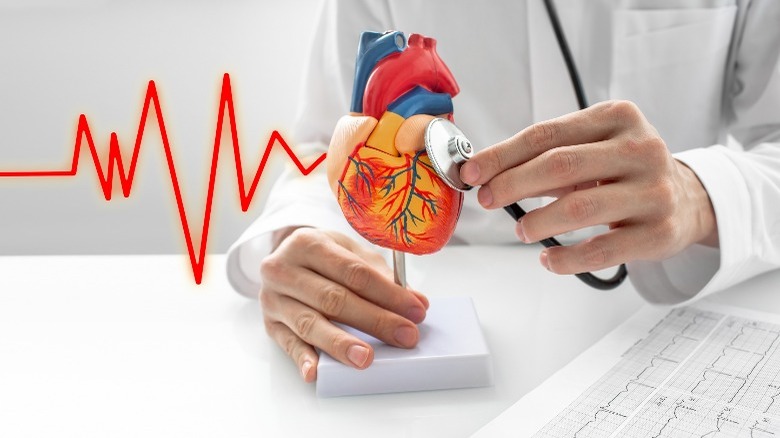What It Really Means When Your Heart Beats Fast For No Reason
If you've ever experienced an irregular heartbeat, you're not alone. According to the experts at Scripps Health, approximately 5% of Americans have an irregular heartbeat, also known as arrhythmia. An arrhythmia is when the heart either beats at an irregular rhythm or at an irregular rate. There have been studies that show that roughly 25% of people over 40 years of age could potentially begin to experience some form of arrhythmia.
Even if you are in optimum health, it's possible for you to temporarily experience or develop arrhythmia. The experts at Scripps Health note, however, that there are certain factors that will raise the risk. So, if you think your heart is beating fast for no reason, it's possible that you are actually engaging in one or more behaviors that are inducing your irregular heartbeat, such as smoking, drinking too much alcohol or caffeine, and experiencing too much stress, among others. Fevers can also cause arrhythmia.
Some symptoms you may experience in association with an irregular heartbeat include chest pain, dizziness, and shortness of breath. Arrhythmias may be harmless or life-threatening, so they can also indicate that something more serious is going on (via Scripps Health).
Is a fast heart rate dangerous?
According to the American Heart Association (AHA), a normal heartbeat should fall between 60 and 100 beats per minute. When your heart beats faster than 100 beats per minute, this is a condition called tachycardia. The experts at the Mayo Clinic state that tachycardia "is caused by something that disrupts the normal electrical impulses that control the rate of your heart's pumping action." Age and family history make you more predisposed to develop tachycardia. Some examples of common kinds of tachycardia include atrial fibrillation, atrial flutter, and ventricular fibrillation. While these conditions have different health implications and occur in distinct areas of the heart, each involves some sort of disruption in the electrical impulses or circuitry within the heart. Common symptoms associated with tachycardia are shortness of breath, fainting, and chest pain, among others.
You can limit the risks associated with tachycardia by maintaining a well-balanced and heart-healthy diet, reducing alcohol consumption, refraining from smoking and drug use, managing stress, and keeping up with a regular exercise routine. If you are experiencing symptoms of tachycardia, the experts at the Mayo Clinic advise that you "get a prompt, accurate diagnosis and appropriate care."


